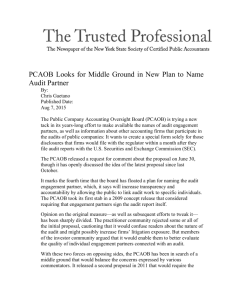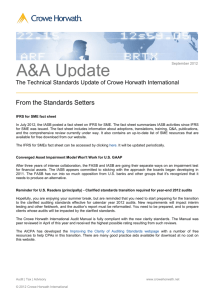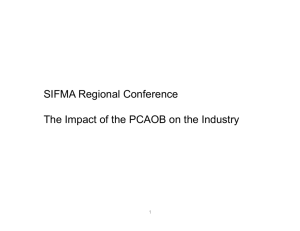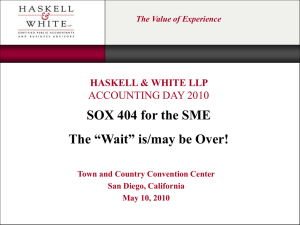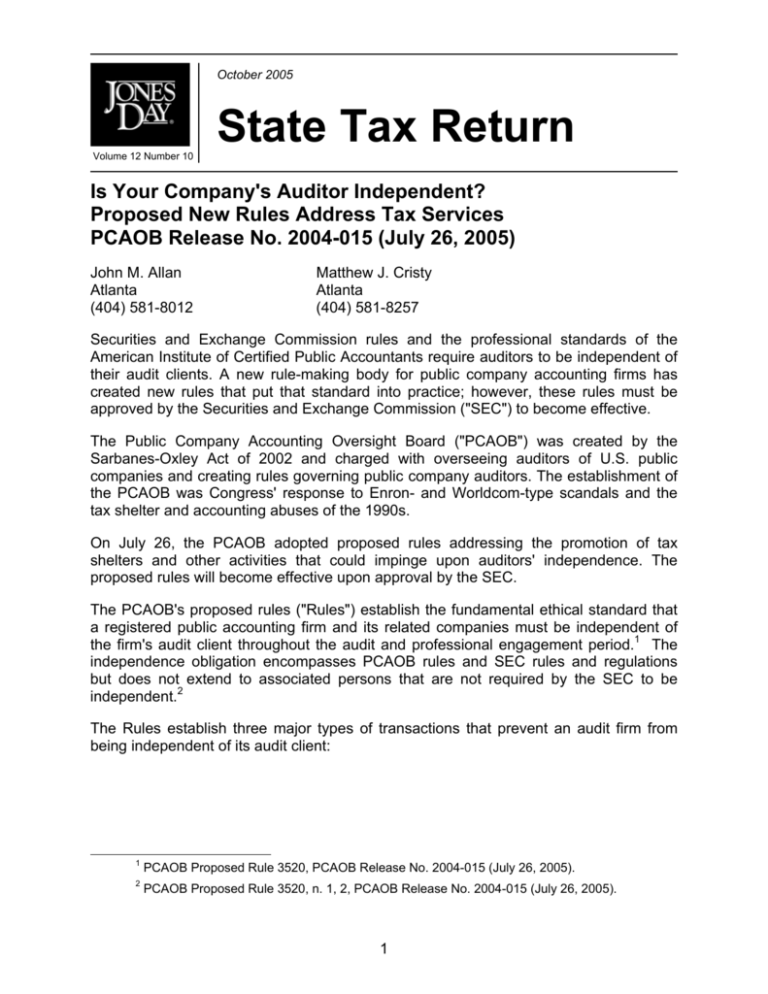
October 2005
Volume 12 Number 10
State Tax Return
Is Your Company's Auditor Independent?
Proposed New Rules Address Tax Services
PCAOB Release No. 2004-015 (July 26, 2005)
John M. Allan
Atlanta
(404) 581-8012
Matthew J. Cristy
Atlanta
(404) 581-8257
Securities and Exchange Commission rules and the professional standards of the
American Institute of Certified Public Accountants require auditors to be independent of
their audit clients. A new rule-making body for public company accounting firms has
created new rules that put that standard into practice; however, these rules must be
approved by the Securities and Exchange Commission ("SEC") to become effective.
The Public Company Accounting Oversight Board ("PCAOB") was created by the
Sarbanes-Oxley Act of 2002 and charged with overseeing auditors of U.S. public
companies and creating rules governing public company auditors. The establishment of
the PCAOB was Congress' response to Enron- and Worldcom-type scandals and the
tax shelter and accounting abuses of the 1990s.
On July 26, the PCAOB adopted proposed rules addressing the promotion of tax
shelters and other activities that could impinge upon auditors' independence. The
proposed rules will become effective upon approval by the SEC.
The PCAOB's proposed rules ("Rules") establish the fundamental ethical standard that
a registered public accounting firm and its related companies must be independent of
the firm's audit client throughout the audit and professional engagement period.1 The
independence obligation encompasses PCAOB rules and SEC rules and regulations
but does not extend to associated persons that are not required by the SEC to be
independent.2
The Rules establish three major types of transactions that prevent an audit firm from
being independent of its audit client:
1
PCAOB Proposed Rule 3520, PCAOB Release No. 2004-015 (July 26, 2005).
2
PCAOB Proposed Rule 3520, n. 1, 2, PCAOB Release No. 2004-015 (July 26, 2005).
1
©Jones Day 2005
1) Contingent fees—If the firm or an affiliate3 provides any service on a contingent fee
or commission or receive a contingent fee or commission from the audit client.
2) Tax transactions—If the firm or an affiliate provides an audit client with any non-audit
service related to the marketing, planning, or opining in favor of the tax treatment of
confidential transactions or aggressive tax position transactions.
3) Tax services to certain persons—If the firm or an affiliate provides any tax service to
a person in a financial reporting oversight role at the audit client or an immediate family
member of such a person.4
Confidential Transactions
The PCAOB believes that requiring clients to maintain the confidentiality of tax products
marketed, planned, or opined in favor of so that those tax products may be marketed to
multiple clients erodes public confidence in the ethics and integrity of public accounting
firms.5 "A reasonable investor easily could infer that the auditor has a vested interest in
advocating to the IRS the tax treatment it promoted, or helped to promote, to multiple
clients and perpetuating that treatment in the audit client's financial statements."6
The Treasury has identified confidential transactions as potentially abusive, and tax
regulations require taxpayers to disclose to the IRS transactions in which a tax advisor
"places a limitation on disclosure by the taxpayer of the tax treatment or tax structure of
the transaction and the limitation on disclosure protects the confidentiality of that
advisor's tax strategies."7
"A confidential transaction is a transaction that is offered to a taxpayer under conditions
of confidentiality and for which the taxpayer has paid an advisor fee."8 A transaction is
offered to a taxpayer "under conditions of confidentiality" if the advisor being paid the
fee "places a limitation on disclosure by the taxpayer of the tax treatment or tax
structure of the transaction and the limitation on disclosure protects the confidentiality of
that tax advisor's tax strategies."9 A transaction is still a confidential transaction even if
the conditions of confidentiality are not legally binding on the taxpayer.
3
"Affiliate of the accounting firm" includes the accounting firm's parents; subsidiaries; pension,
retirement, investment and similar plans; and any associated entities as defined by SEC regulations.
PCAOB Proposed Rule 3501(a)(i), PCAOB Release No. 2004-015 (July 26, 2005).
4
"Immediate family member" means a person's spouse, spousal equivalent, and dependants.
Rule 3501(g)(i), PCAOB Release No. 2004-015 (July 26, 2005).
5
PCAOB Release No. 2004-015, part II(B)(3)(b) (July 26, 2005).
6
PCAOB Release No. 2004-015, part II(B)(3)(b) (July 26, 2005).
7
26 C.F.R. § 1.6011-4(b)(3)(ii).
8
PCAOB Proposed Rule 3501(c)(i)(1), PCAOB Release No. 2004-015 (July 26, 2005).
9
PCAOB Proposed Rule 3501(c)(i)(2), PCAOB Release No. 2004-015 (July 26, 2005).
2
©Jones Day 2005
Registered public accounting firms may not market, plan, or opine in favor of the tax
treatment of a confidential transaction whether or not the accounting firm imposed the
conditions of confidentiality or whether another tax advisor did so.10
A transaction is not offered "under conditions of confidentiality" just because the
promoter or advisor claims that a transaction is proprietary or exclusive if the advisor
"confirms to the taxpayer that there is no limitation on disclosure of the tax treatment or
tax structure of the transaction."11
Aggressive Tax Positions
Under Rule 3522, an accounting firm is not independent of its audit client if the
accounting firm or an affiliate provides services related to the marketing, planning or
opining in favor of the tax treatment of an aggressive tax position transaction. An
aggressive tax position transaction is a transaction initially recommended, directly or
indirectly, by the accounting firm or an affiliate when a significant purpose of the
transaction is tax avoidance.12 An accounting firm indirectly recommends a transaction
when another tax adviser recommends the client engage in the transaction and the
other tax adviser has a formal agreement or other arrangement with the accounting firm
related to the promotion of the transactions.
However, Rule 3522 will allow the auditor to provide services related to the marketing,
planning or opining in favor of a transaction that is "at least more likely than not to be
allowable under applicable tax laws."13 This is the standard taxpayers must meet to
avoid penalties for substantial understatement of income tax due in connection with a
tax shelter.14 "The proposed rules also use this standard, as opposed to a higher
standard, in recognition of the fact that tax laws may often be complex and subject to
differing good faith interpretations."15
All transactions listed by the IRS are considered aggressive tax position transactions.
The PCAOB warned that accounting firms should be cautious in participating in
transactions that the firm believes could become listed because the firm could find its
independence impaired by its mutuality of interest with the audit client.16 If a transaction
10
PCAOB Proposed Rule 3522(a), PCAOB Release No. 2004-015 (July 26, 2005).
11
PCAOB Proposed Rule 3501(c)(i)(2), PCAOB Release No. 2004-015 (July 26, 2005).
12
PCAOB Proposed Rule 3522, PCAOB Release No. 2004-015 (July 26, 2005).
13
PCAOB Proposed Rule 3522(c), PCAOB Release No. 2004-015 (July 26, 2005).
14
Treas. Reg. § 1.6664-4(f)(2)(i)(B) (stating that one requirement for establishing that a
corporation acted with reasonable cause and in good faith in its treatment of a tax shelter item is that the
corporation reasonably believed that the tax treatment was more likely than not the proper treatment,
which requires that either (a) the corporation concluded from its own analysis that there is a greater than
50-percent likelihood that the tax treatment of the item will be upheld if challenged by the I.R.S. or (b) the
corporation relied on the opinion of a professional tax advisor that there is a greater than 50-percent
likelihood that the tax treatment of the item will be upheld if challenged by the I.R.S.).
15
PCAOB Release No. 2004-015, part II(B)(3)(c) (July 26, 2005).
16
PCAOB Release No. 2004-015, part II(B)(3)(a) (July 26, 2005).
3
©Jones Day 2005
planned on or opined by the firm, or a similar transaction, becomes listed, the firm
should discuss the potential impairment of its independence with the client's audit
committee.17
Auditors are permitted to advise against executing an aggressive tax transaction.
However, an auditor may not issue "an opinion that a transaction does not satisfy the
more-likely-than-not standard but does satisfy a lower standard of confidence" or offer
"advice that an audit client will 'probably' lose an argument in favor of a tax treatment,
because such advice can imply up to a 49-percent chance of success."18
According to the PCAOB, aggressive tax positions undermine investor confidence in the
"judgment, objectivity, and ethics" of accounting firms that engage in such
transactions.19 Also, participating in these transactions increases the likelihood that an
accounting firm will not be independent of its audit client because the transactions carry
a high risk that tax authorities will disallow the transaction and such a challenge
increases the mutuality of interest between the firm and its client.20
Relevant Time Period
The restrictions on confidential or aggressive tax position transactions only apply to
services provided during the audit and professional engagement period, which is the
period covered by any financial statements audited and the period of engagement to
audit and review the client's financial statements or to prepare a report filed with the
SEC.21 This period will always apply to ongoing, regular clients of audit firms but not
necessarily to new audit clients, former audit clients and one-time, specialcircumstances audit clients.
Tax Services To Individuals
The PCAOB is concerned that "performing tax services for certain individuals involved
in the financial reporting processes of an audit client creates an appearance of a mutual
interest between the auditor and those individuals."22
There are three exceptions in which an accounting firm may offer tax services to a
person in a financial reporting oversight role:
1) Board of director members—if the person is only considered to be in a financial
reporting oversight role because he or she is on the client's board of directors.
17
PCAOB Release No. 2004-015, part II(B)(3) (July 26, 2005).
18
PCAOB Release No. 2004-015, part II(B)(3) (July 26, 2005).
19
PCAOB Release No. 2004-015, part II(B)(3) (July 26, 2005).
20
PCAOB Release No. 2004-015, part II(B)(3) (July 26, 2005).
21
PCAOB Proposed Rule 3501(a)(iii)(2), PCAOB Release No. 2004-015 (July 26, 2005).
22
PCAOB Release No. 2004-015, part II(B)(4) (July 26, 2005).
4
©Jones Day 2005
2) Role with affiliate—if the person is only considered to be in a financial reporting
oversight role because of that person's relationship to an affiliate of the audit client. One
of two conditions must be met for this exception:
A) The affiliate's financial statements must not be material to the consolidated financial
statements of the audit client; or
B) The affiliate's financial statements must be audited by an auditor other than the audit
firm or an associated person of the audit firm.
3) New in oversight role—if the person was not in a financial oversight role before a
hiring, promotion, or change in employment and the engagement for the tax services
was in process before that event and is completed within 180 days of that event.23
Audit Committee Pre-Approval
In order to obtain pre-approval from the client's audit committee to perform permissible
tax services, the audit firm must take the following actions:
1) The audit firm must provide the following information to the committee in writing:
a) The scope of the service, the fee structure, and any side letters or amendments to
the engagement letter related to the service, and
b) Any compensation arrangement or other agreement (such as referral agreements,
referral fees, or fee-sharing agreements) with any third party related to promoting,
marketing, or recommending transactions involved in the service;
2) Discuss with the committee how the services could potentially affect the audit firm's
independence; and
3) Document the substance of the discussion.24
Conclusion
The PCAOB's proposed rules create a greater burden for public company audit
committees, which must approve in advance all non-audit services provided by audit
firms. However, the rules also help audit committees obtain a better grasp over the tax
services provided by their auditors and the potential conflicts those services create. The
rules require auditors to inform the audit committee when their non-audit services might
create a conflict of interest and to justify services that could create potential conflicts.
The rules will prevent audit firms from providing some services that companies and
directors may find beneficial or convenient, such as certain types of tax planning
products for the company and individual tax planning services for management and
23
PCAOB Proposed Rule 3523, PCAOB Release No. 2004-015 (July 26, 2005).
24
PCAOB Proposed Rule 3524, PCAOB Release No. 2004-015 (July 26, 2005).
5
©Jones Day 2005
directors. However, these provisions also protect the company. The rules ensure that
auditors are not compromised and can provide objective audits of a public company's
financial records. This protects shareholders and helps the board better supervise the
company and its management. The rules also ensure that accounting firms—at least the
one auditing the company—do not sell potentially abusive tax products to the company.
Although the proposed rules explicitly prohibit certain transactions, the true effect of the
rules (if approved by the SEC) will be decided largely in the board room as audit
committees decide on a case-by-case basis whether or not to approve tax services that
potentially create conflicts of interest. The rules give the audit committee more tools and
information to make these decisions, but it is yet to be seen whether the audit
committees will use those tools to ensure auditor independence or will rubber stamp the
plans of management and audit firms.■
This article is reprinted from the State Tax Return, a Jones Day monthly newsletter reporting on recent
developments in state and local tax. Requests for a subscription to the State Tax Return or permission
to reproduce this publication, in whole or in part, or comments and suggestions should be sent to
Christine Rhodes (614/281-3911 or crhodes@jonesday.com) in Jones Day’s Columbus Office, P.O.
Box 165017, Columbus, Ohio 43216-5017.
©Jones Day 2005. All Rights Reserved. No portion of the article may be reproduced or used without
express permission. Because of its generality, the information contained herein should not be
construed as legal advice on any specific facts and circumstances. The contents are intended for
general information purposes only.
6

